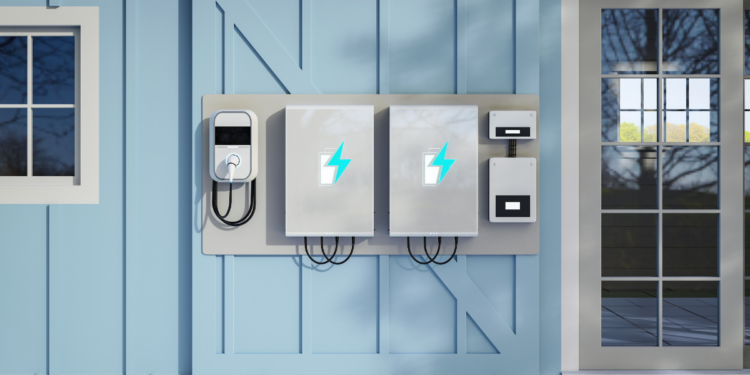Home battery systems are transforming the way homeowners manage energy, offering an efficient solution for storing excess power generated by renewable sources like solar panels. By optimizing energy usage and reducing reliance on the grid, these systems provide a cost-effective and environmentally friendly way to power your home. Popular options like the Tesla Powerwall and LG Chem RESU have made energy storage more accessible, allowing more households to benefit from this innovative technology.
This article explores how home battery systems work, their benefits, and tips for maximizing energy efficiency and savings.
How Home Battery Systems Work
Energy Storage and Distribution
Home battery systems store energy produced by renewable sources, such as solar panels, or from the grid during off-peak hours. This stored energy is then used during high-demand periods or when renewable energy production is low. The system acts as a buffer, ensuring a steady power supply regardless of external conditions.
For example, during the evening when solar panels stop generating electricity, the battery can provide stored energy to power your home.
Grid Integration
Most home battery systems are designed to integrate seamlessly with the electrical grid. This allows homeowners to participate in time-of-use (TOU) pricing, storing energy when electricity rates are low and using it when rates are high. This strategy not only reduces energy costs but also helps stabilize the grid during peak demand.
In regions with frequent power outages, grid-integrated systems can also serve as backup power sources, ensuring uninterrupted access to essential appliances.
To understand how clean energy integrates with modern power grids, explore this resource on Grid Integration from the Clean Energy Ministerial. It provides valuable insights into optimizing renewable energy use within grid systems.
Renewable Energy Support
For homes equipped with solar panels, battery systems store excess energy produced during the day. This energy can be used at night or during cloudy weather, maximizing the value of your renewable energy investment. By reducing the need for grid electricity, battery systems make renewable energy more practical and efficient for everyday use.
This integration allows homeowners to minimize waste and increase their energy independence.

Benefits of Home Battery Systems
1. Lower Energy Costs
One of the main advantages of home battery systems is the ability to save on energy costs. By storing electricity during off-peak hours and using it during peak times, homeowners can take advantage of lower rates while avoiding higher energy charges. This is particularly beneficial in areas with TOU pricing structures.
Additionally, storing and using renewable energy reduces dependency on the grid, further lowering monthly bills.
For practical advice on reducing your energy costs, check out How to Save on Your Energy Bills from the NRDC. This guide offers simple tips to lower energy usage and cut down expenses.
2. Increased Energy Independence
Home battery systems enable households to rely less on the grid by maximizing the use of self-generated renewable energy. During outages or disruptions, batteries can supply power to critical devices, ensuring greater energy security. This independence is especially valuable for homes in remote areas or regions prone to blackouts.
Energy independence gives homeowners greater control over their power supply and reduces their vulnerability to rising energy costs.
3. Environmental Benefits
By optimizing the use of renewable energy and reducing reliance on fossil-fuel-based grid electricity, home battery systems significantly lower carbon emissions. Households with energy storage systems contribute to a more sustainable future by minimizing their environmental footprint.
These systems align with the goals of a greener lifestyle and support global efforts to combat climate change.
4. Backup Power During Emergencies
Battery systems provide a reliable backup power source during emergencies, such as storms or grid failures. By storing energy for use when the grid is down, these systems ensure critical appliances like refrigerators, medical equipment, and communication devices remain operational.
Having a backup system in place offers peace of mind and protects against unexpected power disruptions.
For insights into how AI is transforming energy storage, explore our article on AI in Managing Household BatteryStorage Systems. Learn how smart systems optimize energy use and enhance efficiency in modern homes.

Popular Home Battery Systems
Tesla Powerwall
The Tesla Powerwall is one of the most well-known home battery systems on the market. It stores excess solar energy and provides backup power during outages. With a sleek design and high storage capacity, the Powerwall integrates seamlessly with Tesla’s app, allowing users to monitor and manage energy usage in real time.
Key Features:
- 13.5 kWh capacity
- Backup power capabilities
- Time-of-use optimization
LG Chem RESU
The LG Chem RESU series offers compact, modular battery systems suitable for residential use. Designed to work with a variety of inverters, the RESU can be customized to meet specific energy storage needs. Its scalability and reliability make it a popular choice for homeowners seeking flexible energy solutions.
Key Features:
- Scalable storage capacity
- Compact design
- Compatible with various solar systems
Enphase Encharge
Enphase Encharge systems provide modular storage options that integrate seamlessly with solar panels. The system offers real-time energy monitoring through the Enphase Enlighten app, allowing users to track energy production, usage, and storage. Its modular design ensures flexibility and scalability for growing energy needs.
Key Features:
- Modular design
- Real-time monitoring
- Efficient integration with solar panels
Maximizing the Benefits of Home Battery Systems
Time-of-Use Strategies
Take advantage of TOU pricing by charging your battery during off-peak hours when electricity rates are low and using stored energy during peak hours. This strategy helps maximize cost savings and minimizes grid dependence.
Combine with Renewable Energy
Pairing a home battery system with renewable energy sources like solar panels enhances its efficiency and environmental benefits. By storing excess solar energy for later use, you can optimize your investment in renewable energy and reduce waste.
Monitor Energy Usage
Use companion apps to monitor your energy usage, storage levels, and production rates. This data allows you to adjust habits and improve efficiency over time, ensuring you’re getting the most out of your system.
Plan for Backup Power
Ensure your battery system is configured to prioritize critical devices during power outages. Proper planning guarantees that essential appliances remain functional, providing security and comfort during emergencies.
Home battery systems are revolutionizing energy management by providing efficient storage solutions for renewable energy and reducing reliance on the grid. With benefits like lower energy costs, increased independence, and environmental advantages, these systems are a valuable addition to any modern home. Whether you choose a Tesla Powerwall, LG Chem RESU, or another option, investing in a battery storage system can help you optimize energy usage and create a sustainable future.
For a look at how artificial intelligence can streamline your daily tasks, check out our guide on AI-Powered Apps forSmarter Home Management. Discover innovative tools that make managing your home easier and more efficient.






















